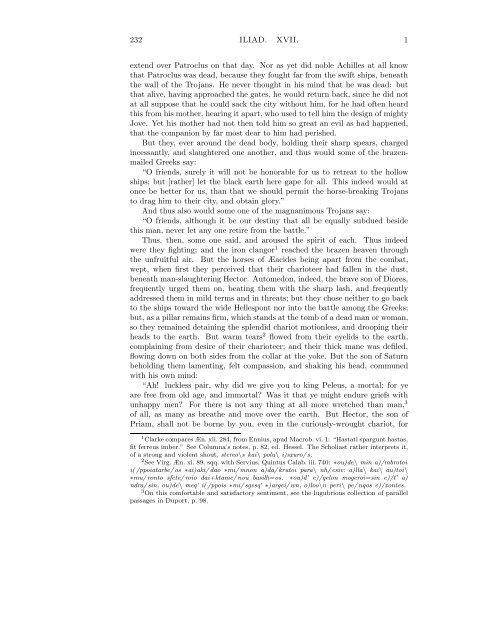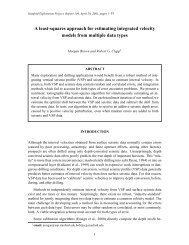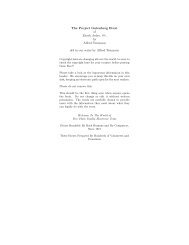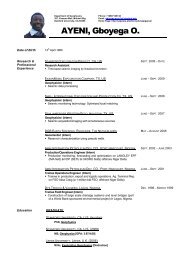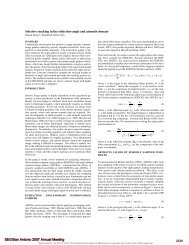The Project Gutenberg Etext of the Iliad of - Stanford Exploration ...
The Project Gutenberg Etext of the Iliad of - Stanford Exploration ...
The Project Gutenberg Etext of the Iliad of - Stanford Exploration ...
Create successful ePaper yourself
Turn your PDF publications into a flip-book with our unique Google optimized e-Paper software.
232 ILIAD. XVII. 1<br />
extend over Patroclus on that day. Nor as yet did noble Achilles at all know<br />
that Patroclus was dead, because <strong>the</strong>y fought far from <strong>the</strong> swift ships, beneath<br />
<strong>the</strong> wall <strong>of</strong> <strong>the</strong> Trojans. He never thought in his mind that he was dead: but<br />
that alive, having approached <strong>the</strong> gates, he would return back, since he did not<br />
at all suppose that he could sack <strong>the</strong> city without him, for he had <strong>of</strong>ten heard<br />
this from his mo<strong>the</strong>r, hearing it apart, who used to tell him <strong>the</strong> design <strong>of</strong> mighty<br />
Jove. Yet his mo<strong>the</strong>r had not <strong>the</strong>n told him so great an evil as had happened,<br />
that <strong>the</strong> companion by far most dear to him had perished.<br />
But <strong>the</strong>y, ever around <strong>the</strong> dead body, holding <strong>the</strong>ir sharp spears, charged<br />
incessantly, and slaughtered one ano<strong>the</strong>r, and thus would some <strong>of</strong> <strong>the</strong> brazenmailed<br />
Greeks say:<br />
“O friends, surely it will not be honorable for us to retreat to <strong>the</strong> hollow<br />
ships; but [ra<strong>the</strong>r] let <strong>the</strong> black earth here gape for all. This indeed would at<br />
once be better for us, than that we should permit <strong>the</strong> horse-breaking Trojans<br />
to drag him to <strong>the</strong>ir city, and obtain glory.”<br />
And thus also would some one <strong>of</strong> <strong>the</strong> magnanimous Trojans say:<br />
“O friends, although it be our destiny that all be equally subdued beside<br />
this man, never let any one retire from <strong>the</strong> battle.”<br />
Thus, <strong>the</strong>n, some one said, and aroused <strong>the</strong> spirit <strong>of</strong> each. Thus indeed<br />
were <strong>the</strong>y fighting; and <strong>the</strong> iron clangor 1 reached <strong>the</strong> brazen heaven through<br />
<strong>the</strong> unfruitful air. But <strong>the</strong> horses <strong>of</strong> Æacides being apart from <strong>the</strong> combat,<br />
wept, when first <strong>the</strong>y perceived that <strong>the</strong>ir charioteer had fallen in <strong>the</strong> dust,<br />
beneath man-slaughtering Hector. Automedon, indeed, <strong>the</strong> brave son <strong>of</strong> Diores,<br />
frequently urged <strong>the</strong>m on, beating <strong>the</strong>m with <strong>the</strong> sharp lash, and frequently<br />
addressed <strong>the</strong>m in mild terms and in threats; but <strong>the</strong>y chose nei<strong>the</strong>r to go back<br />
to <strong>the</strong> ships toward <strong>the</strong> wide Hellespont nor into <strong>the</strong> battle among <strong>the</strong> Greeks;<br />
but, as a pillar remains firm, which stands at <strong>the</strong> tomb <strong>of</strong> a dead man or woman,<br />
so <strong>the</strong>y remained detaining <strong>the</strong> splendid chariot motionless, and drooping <strong>the</strong>ir<br />
heads to <strong>the</strong> earth. But warm tears 2 flowed from <strong>the</strong>ir eyelids to <strong>the</strong> earth,<br />
complaining from desire <strong>of</strong> <strong>the</strong>ir charioteer; and <strong>the</strong>ir thick mane was defiled,<br />
flowing down on both sides from <strong>the</strong> collar at <strong>the</strong> yoke. But <strong>the</strong> son <strong>of</strong> Saturn<br />
beholding <strong>the</strong>m lamenting, felt compassion, and shaking his head, communed<br />
with his own mind:<br />
“Ah! luckless pair, why did we give you to king Peleus, a mortal; for ye<br />
are free from old age, and immortal? Was it that ye might endure griefs with<br />
unhappy men? For <strong>the</strong>re is not any thing at all more wretched than man, 3<br />
<strong>of</strong> all, as many as brea<strong>the</strong> and move over <strong>the</strong> earth. But Hector, <strong>the</strong> son <strong>of</strong><br />
Priam, shall not be borne by you, even in <strong>the</strong> curiously-wrought chariot, for<br />
1Clarke compares Æn. xii. 284, from Ennius, apud Macrob. vi. 1: “Hastati spargunt hastas,<br />
fit ferreus imber.” See Columna’s notes, p. 82, ed. Hessel. <strong>The</strong> Scholiast ra<strong>the</strong>r interprets it,<br />
<strong>of</strong> a strong and violent shout, stereo\s kai\polu\ i)sxuro/ s.<br />
2See Virg. Æn. xi. 89, sqq. with Servius, Quintus Calab. iii. 740: ∗ou)de\ min a)/mbrotoi<br />
i( /ppoiatarbe/ os ∗ai)aki/ dao ∗mi/ mnon a)da/ krutoi para\ nh/ esiv: a)lla\ kai\ au)toi\<br />
∗mu/ ronto sfete/ roio dai+ktame/ nou basilh=os. ∗ou)d’ e)/qelon mogeroi=sin e)/t’ a)<br />
ndra/ sin, ou)de\ meq’ i( /ppois ∗mi/ sgesq’ ∗)argei/ wn, o)loo\n peri\ pe/ nqos e)/xontes.<br />
3On this comfortable and satisfactory sentiment, see <strong>the</strong> lugubrious collection <strong>of</strong> parallel<br />
passages in Duport, p. 98.


